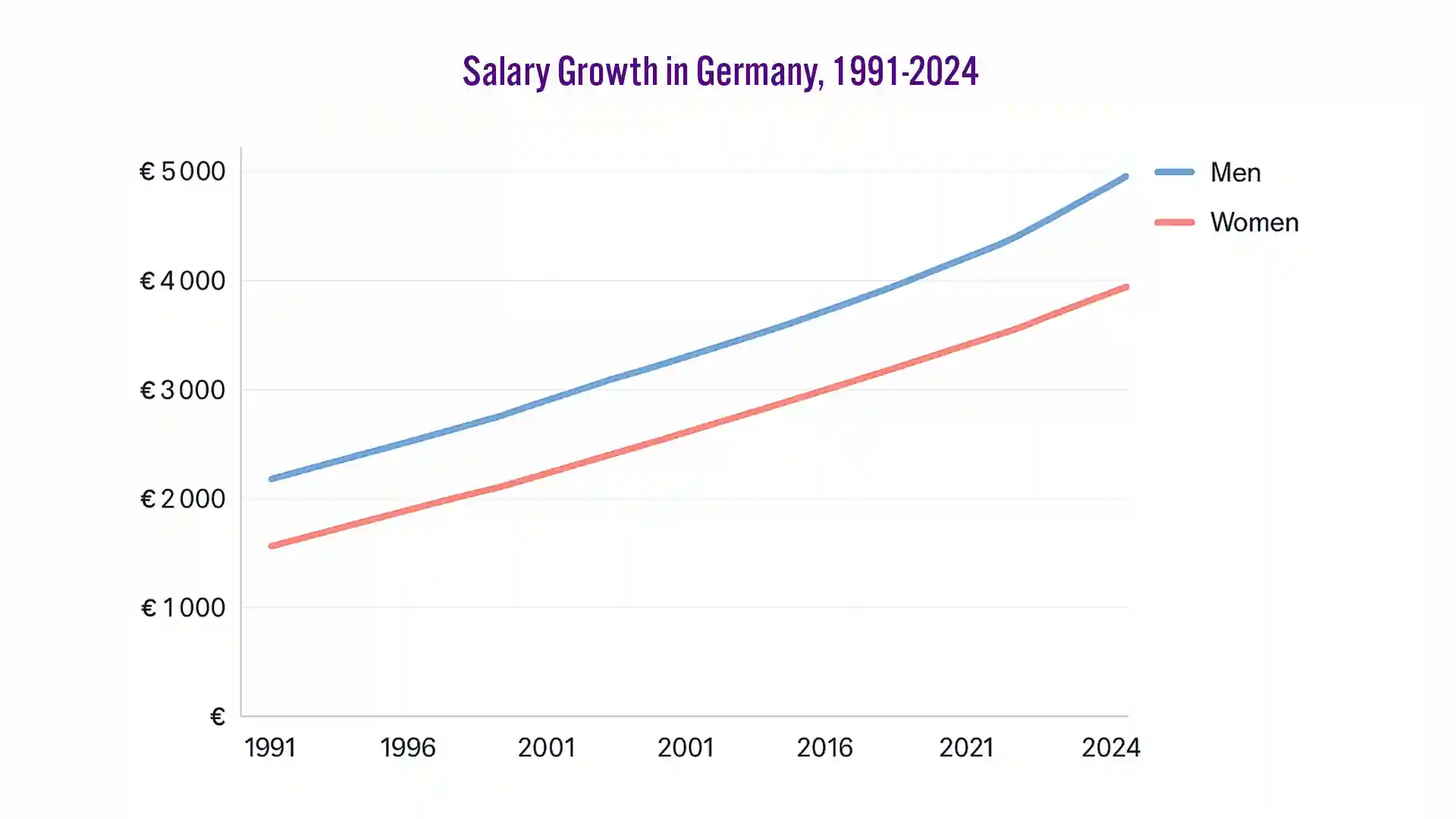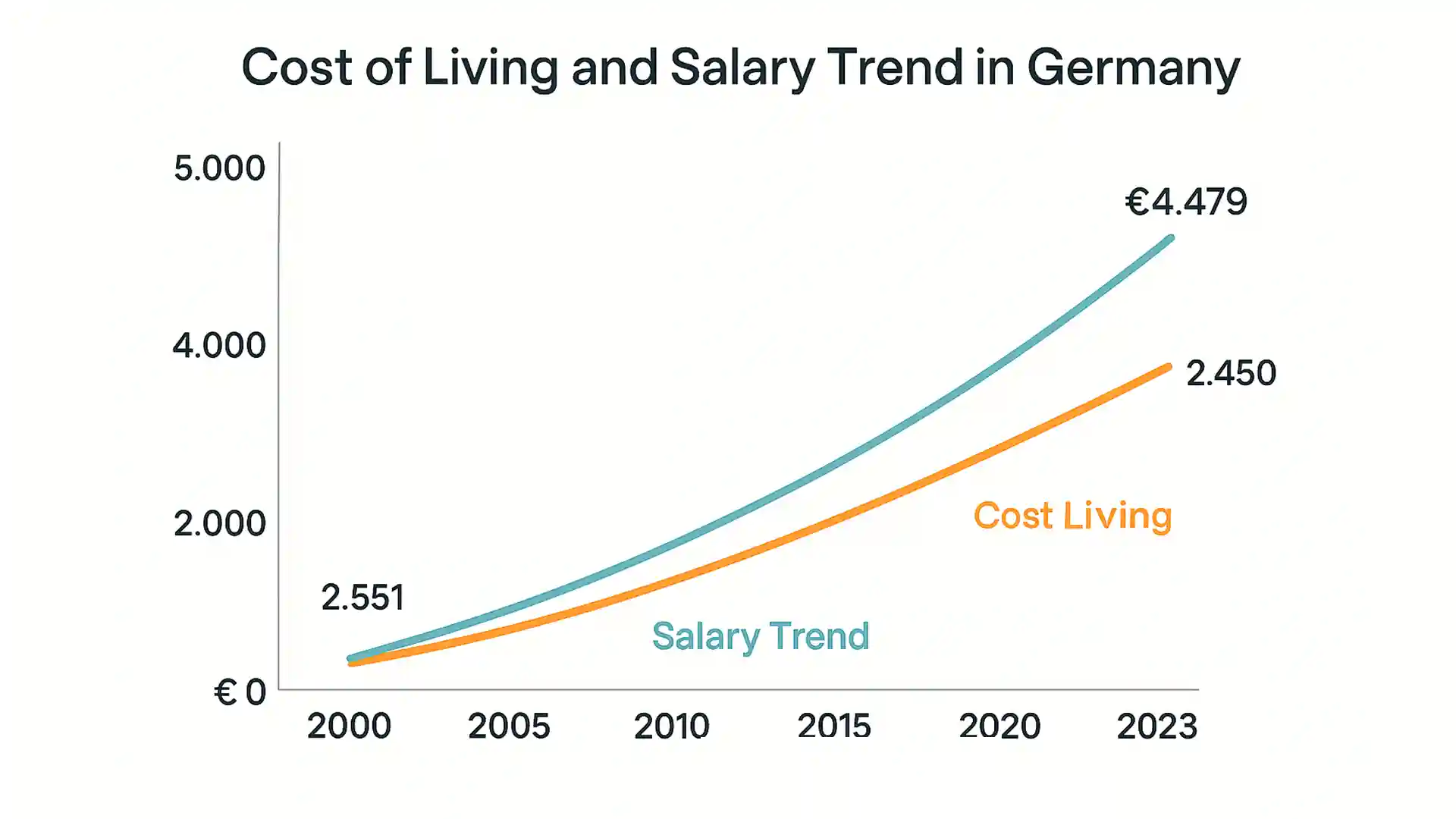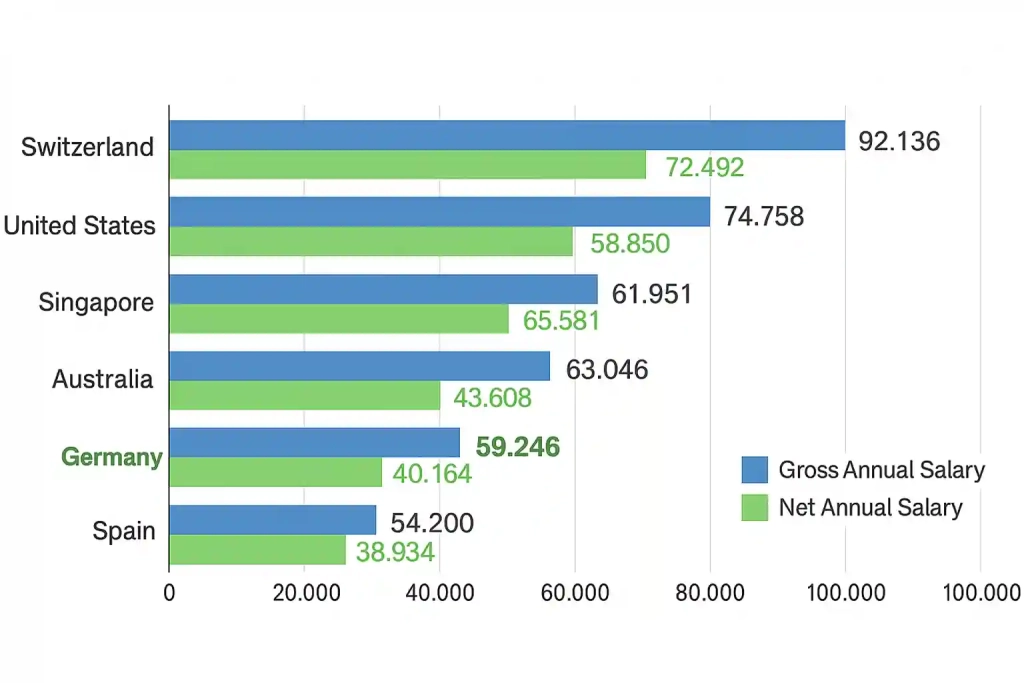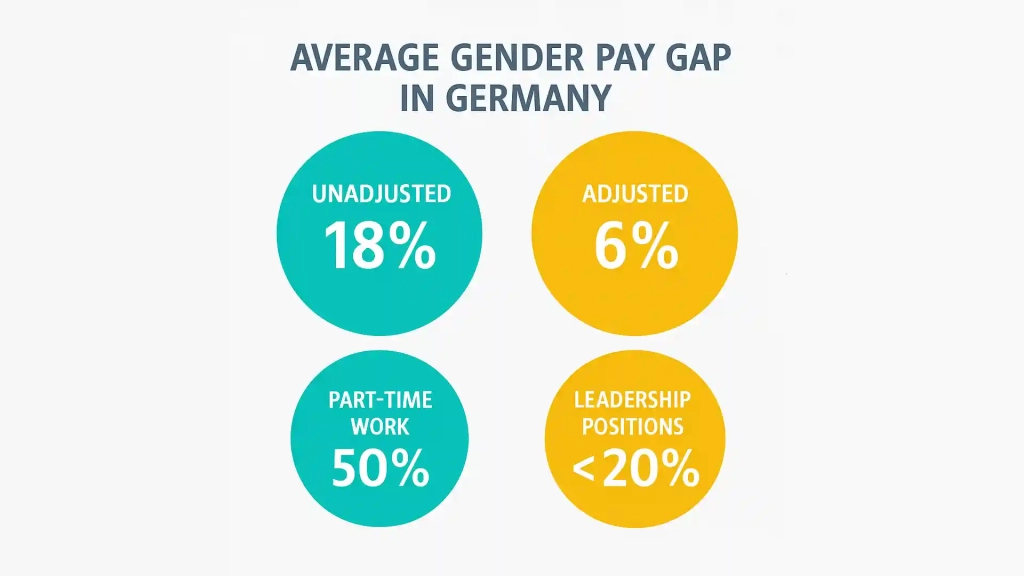- What Is the Average Salary In Germany In 2025? Monthly And Annual Figures
- Long-Term Salary Trends in Germany
- Salary Growth by Industry in Germany
- Cost of Living in Germany: Can Your Salary Cover It?
- Minimum Wage in Germany 2025: What You’re Legally Entitled To
- Germany Salaries Compared to Other Countries
- Average Salary in Germany by State: Regional Breakdown
- FAQ:
- What is the minimum wage in Germany per hour?
- What is the median income in Germany?
- What is the difference between median income and average salary?
- What is considered a good salary in Germany?
- Is 4000 euros a month good in Germany?
- What is the top 1% salary in Germany?
- What is the middle class salary in Germany?
- What salary is needed to live comfortably in Germany?
- What monthly salary is considered rich in Germany?
- What is a good salary raise in Germany?
- Is 50k salary good in Germany?
- Is 60k euros a good salary in Germany?
- Is 70k a good salary in Germany?
- Is 100k good in Germany?
What Is the Average Salary In Germany In 2025? Monthly And Annual Figures
In 2025, the average gross salary in Germany is €59,246 per year or €4,937 per month. Net salary averages €2,850 per month.
These figures include standard bonuses like Christmas and 13th-month pay. Without extras, the average gross monthly salary is €4,479.
Understanding how much you can expect to earn in Germany is essential, especially if you’re planning to relocate, apply for a visa, or negotiate a contract.
This guide is based on the latest available data from official German sources and is designed to give you a complete and accurate picture of what salaries in Germany really look like. Whether you’re moving to Germany, changing jobs, or just want to know how much you should earn, this is your go-to reference.
Germany 2025 Salary Breakdown: Gross, Net & Bonuses
Here’s a quick snapshot of the most important salary figures in Germany for 2025 — including gross, net, and minimum wage benchmarks. These are the numbers that matter for contracts, budgeting, and comparing job offers.
| Type | Amount | Notes |
|---|---|---|
| Gross (with bonus) | €4,937 | Includes 13th salary, etc. |
| Gross (base only) | €4,479 | Regular monthly payslip |
| Net (after tax) | €2,850 | Average take-home salary |
| Minimum wage | €2,222 | Based on €12.82/hour, 40h week |
| Median salary | €4,323 | Half earn more, half earn less |
Updated 2025 Salary Data in Germany
Verified by KUMMUNI Research
Unlike most websites that still cite 2023 statistics from Statistisches Bundesamt, this guide uses updated 2025 salary data. KUMMUNI Research analyzed the latest government figures and cross-checked them with real-time job listings and verified employer data. This is accurate, original research designed for expats, professionals, and job seekers who need to know what people in Germany actually earn in 2025.
Long-Term Salary Trends in Germany
Over the past three decades, salaries in Germany have followed a steady upward trend. Since 2000, the average income in Germany has grown by more than 75%. This growth, though uneven across sectors, reflects increased labor value, technological advancement, and industrial development.
Men continue to earn more than women across most industries, revealing the persistence of the gender pay gap in Germany, which we address further below. Still, the long-term view is clear: salaries are rising, especially for skilled professionals and those in high-demand roles.
The graph also illustrates the persistent gap between men’s and women’s salaries—a topic that will be addressed later in this article. However, the focus here is on the overall salary progression, which confirms that working in Germany has become financially more rewarding over time, particularly for skilled professionals and full-time employees.

This long-term salary trend is a key factor for both residents and newcomers evaluating job opportunities, financial planning, and lifestyle expectations in Germany.
Salary Growth by Industry in Germany
In 2025, the highest salary growth rates are seen in:
- Technology and IT: 5%–7% annual growth
- Green energy & renewables: 4%–6%
- Healthcare and life sciences: 3%–5%
Meanwhile, more traditional sectors like construction, education, and hospitality are growing at slower paces but remain vital for the job market. For example:
- Software developer salary in Germany: €60,000–€75,000 gross/year
- Construction worker salary Germany: €35,000–€45,000
- Teaching salary in Germany: €40,000–€55,000
- Nurse salary Germany: €36,000–€44,000
- Hospitality and cleaning jobs: €25,000–€32,000
Which Industries Will See Salary Growth in Germany?
Projected salary growth in Germany is highest in sectors like technology (5-7%), renewable energy (4-6%), and healthcare (3-5%). Rising demand for skills in data science, green energy, and medical roles drives strong career and salary growth potential in these fields.
Certain industries, aligned with Germany’s economic focus, show promising salary growth potential, with a strong demand for data science, healthcare, and green energy roles.
Cost of Living in Germany: Can Your Salary Cover It?
While salaries are rising, so is the cost of living in Germany. Rent, energy, and groceries continue to climb, especially in large cities.
| Monthly Expense | Estimated Range |
|---|---|
| Rent (1-bedroom, major city) | €950–€1,300 |
| Utilities & Internet | €250–€450 |
| Groceries & Food | €300–€450 |
| Public Transport | €60–€100 |
| Health Insurance (public share) | €450–€850 (mostly paid by employer) |
For single individuals, monthly living costs typically range between €2,000 and €2,400, depending on the city. Families, especially in metropolitan areas, face higher expenses that can exceed €5,000 per month. In contrast, smaller cities and towns offer more affordable living, although average salaries in those areas tend to be lower.
The average net salary in Germany is approximately €2,850 per month, which still covers basic needs and modest discretionary spending. However, rent alone in cities like Munich or Hamburg can take up over a third of monthly income. Rising energy costs and inflation in services have further tightened budgets across all income levels.
Despite these challenges, Germany offers publicly funded healthcare, strong tenant protection laws, and low-cost higher education, which ease some financial burdens. Still, for newcomers and expats, it’s essential to evaluate local costs carefully against expected earnings.
In summary, the cost of living in Germany remains manageable for most full-time earners, but the gap between wages and expenses is growing. Choosing the right region and understanding post-tax income are key to maintaining financial stability.
Do Salaries in Germany Match the Cost of Living?

Salaries in Germany have increased steadily over the last two decades. In 2000, the average gross monthly salary was €2,551. By 2023, it reached €4,479.
Living costs have grown much faster. In 2000, a single person could manage with around €1,100 per month. Today, the same lifestyle requires roughly €2,450. That’s a 123% increase in expenses, while salaries rose by just 75%.
Rent is the biggest factor. Housing prices in cities like Berlin and Munich have more than doubled. Energy costs, food, and transport have also seen sharp increases, especially in recent years. Inflation, housing shortages, and higher taxes on utilities have all contributed to this upward trend.
When evaluating a job offer, it’s essential to compare salary vs actual expenses, especially in large cities where rent can exceed 30–40% of net income. Use tools like salary after tax calculators to estimate your true take-home pay before signing a contract.
Minimum Wage in Germany 2025: What You’re Legally Entitled To
The minimum wage currently is €12.82 per hour, resulting in approximately €2,222 monthly for full-time employees working 40 hours per week. Industries such as vocational training services and the roofing trade have established higher minimum wages to attract skilled professionals and ensure fair compensation.
For example, in the vocational training sector, educational staff will earn a minimum of €19.37 per hour starting January 1, 2025, while skilled workers in the roofing trade will receive €16.00 per hour throughout 2025. These adjustments highlight Germany’s commitment to fair compensation and worker protection across various sectors.
Median Salary in Germany 2025: Better Benchmark Than Average
While the average salary in Germany provides a broad overview of earnings across different regions and industries, the median salary offers a more accurate picture of what most employees actually earn. The median salary represents the midpoint, meaning that half of the workforce earns more, and the other half earns less.
Unlike the average, the median is not skewed by extremely high salaries in specific sectors or industries, making it a more reliable indicator of typical income.
According to the latest data, the median gross annual salary in Germany is approximately €51,876, or around €4,323 per month. This figure represents earnings across various industries and experience levels, offering a clearer reflection of what the typical worker earns.
However, significant differences exist based on factors such as region, industry, and professional background, meaning that salaries in high-demand fields or major cities may be notably higher.
Entry-Level & Internship Salaries in Germany
Salaries can vary significantly based on career stage. While national averages provide a useful benchmark, it’s important to recognize that entry-level and intern salaries in Germany start well below the median—especially for newcomers to the workforce. Here’s what early-career professionals and students can typically expect to earn:
| Category | Gross Annual Salary | Gross Monthly Salary | Notes |
|---|---|---|---|
| Entry-Level (General) | €38,000 – €45,000 | ~€3,167 – €3,750 | Typical for recent graduates across most fields |
| Entry-Level (High-Demand Fields) | Up to €50,000+ | €4,000+ | Common in IT, engineering, and data science |
| Interns (Regulated, >3 months) | N/A | €1,000 – €1,500 | Varies by industry and region; applies to regulated internships only |
FUN FACT
German median income
The median salary in Germany in 2025 is €51,876 per year, meaning half the population earns less and half earns more. This is often a better benchmark than the average, which can be skewed by high earners in specific industries.
Germany Salaries Compared to Other Countries

For a better understanding of the salary landscape, Germany’s earnings were compared to those of several top countries for expats, including Switzerland, the United States, Singapore, Australia, and Spain.
The salary figures presented reflect gross annual income including special payments such as Christmas and holiday bonuses, ensuring a realistic and fair comparison between destinations.
Although average salary in Germany is strong compared to many other countries, the net income after taxes is lower than in Switzerland or Singapore, where tax systems favor higher take-home pay.
However, Germany balances this with affordable healthcare, strong employee rights, and free or low-cost education, which are major factors for expats seeking long-term stability rather than just a high paycheck.
In Germany, mandatory public health insurance costs around €7,500 per year, heavily subsidized by employers, compared to the United States, where private health insurance often exceeds €10,000 annually for individuals.
Germany ranks among the top OECD countries for employment protection, offering significantly stronger job security than in deregulated markets like the U.S. or Australia.
For international professionals evaluating relocation options, it’s important to look beyond the gross salary. Germany’s cost of living in relation to salary, combined with worker protection laws, affordable healthcare, and long-term visa opportunities, creates a highly attractive environment for those planning a sustainable future abroad.
While Germany may not offer the highest net salaries among top expat destinations, it consistently delivers a high quality of life, strong social benefits, and secure employment opportunities that continue to attract skilled workers from around the world.
Salaries by Profession in Germany: Gross vs Net Explained
Popular professions in Germany, particularly for expats, vary widely in average salary. For example, software engineers earn around €65,000 gross annually, while registered nurses earn approximately €37,000. Net income after taxes typically ranges from €2,500 to €4,800, depending on profession, experience, tax class, and region.
Germany attracts skilled workers across tech, healthcare, and finance. Here’s a look at the average salary in Germany for popular professions among expats:
| Profession | Annual Gross Salary (€) | Monthly Net Salary (€) |
|---|---|---|
| Software Engineer | 60,000 – 75,000 | 3,500 – 4,500 |
| Mechanical Engineer | 50,000 – 70,000 | 3,000 – 4,200 |
| Data Scientist | 55,000 – 80,000 | 3,200 – 4,800 |
| Project Manager | 65,000 – 85,000 | 3,800 – 5,100 |
| IT Consultant | 60,000 – 80,000 | 3,500 – 4,800 |
| Lawyer | 70,000 – 100,000 | 4,000 – 6,000 |
| Pharmacist | 60,000 – 80,000 | 3,500 – 4,800 |
| Dentist | 80,000 – 120,000 | 4,800 – 7,200 |
| Architect | 50,000 – 70,000 | 3,000 – 4,200 |
| Cybersecurity Specialist | 65,000 – 90,000 | 3,800 – 5,400 |
| Marketing Manager | 55,000 – 75,000 | 3,200 – 4,500 |
| Network Administrator | 45,000 – 65,000 | 2,800 – 3,900 |
| Aerospace Engineer | 70,000 – 90,000 | 4,000 – 5,400 |
FUN FACT
Cost of Living and Index Cost in Germany
Since 2000, the cost of living in Germany has increased by 123%, while average salaries have only risen by 75%. Housing, energy, and food prices are the main contributors to this widening gap.
How Company Size Impacts Your Salary in Germany
In Germany, company size plays a significant role in determining the average salary of employees. Larger enterprises tend to offer higher wages compared to smaller businesses, primarily due to their greater financial resources, more complex job responsibilities, and the possibility of collective bargaining agreements that ensure better compensation.
Employees in larger companies earn, on average, significantly more than those working in smaller companies. Larger companies, with more than 50 employees, typically offer salaries that are approximately 25% higher than those in small enterprises with fewer than 10 employees.
In larger companies, especially those with more than 250 employees, salaries are often negotiated under collective bargaining agreements. These agreements ensure standardized pay scales, job protections, and regular raises, leading to higher average salaries compared to smaller firms.
Small businesses may offer more flexible working conditions but typically cannot match the financial benefits negotiated through unions or employee councils.
Here’s a breakdown of average monthly salaries based on company size:
| Company Size | Average Monthly Gross Salary (€) |
|---|---|
| Small enterprises (1–9 employees) | €3,500 |
| Medium-sized enterprises (10–49 employees) | €4,000 |
| Large enterprises (50+ employees) | €5,000 |
Salary in Germany by Education Level
Higher education correlates with higher salaries in Germany. For example, professionals with a Master’s degree earn around €60,000 annually, while those with a Ph.D. see average salaries as high as €75,000. Bachelor’s degree holders earn approximately €47,000.
Educational attainment can significantly boost average income in Germany, with advanced degrees in high-demand fields leading to higher salaries.
| Education Level | Annual Gross Salary (€) |
|---|---|
| Bachelor’s Degree | 42,000 |
| Master’s Degree | 55,000 |
| Ph.D. | 75,000 |
Advanced degrees, particularly in engineering, technology, and finance, are valued and can lead to significantly higher earnings.
How German Language Skills Affect Salaries for Expats
Fluency in German increases job prospects and income potential for expats, especially for management roles. While tech and finance jobs in Berlin and Munich may only require English, learning German can open doors to higher-paying opportunities across diverse fields.
The average salary in Germany reflects a broad range of income levels shaped by industry, region, and language skills. While English-speaking roles in multinational companies or startups can provide competitive pay, many of the more lucrative and senior-level positions—particularly in traditional or client-facing sectors—are typically reserved for those with fluent German.
Employers often associate language proficiency with deeper integration into the workplace culture and greater communication capabilities, especially in leadership or supervisory roles.
Language skills play a critical role in job opportunities, with German fluency often leading to higher-paying roles, especially outside tech and finance where German is less essential.
Average Salary in Germany by State: Regional Breakdown
The average salary in Germany varies significantly across its 16 federal states, influenced by economic development, industry distribution, and cost of living. Here’s an overview of the average gross annual salaries by state, providing insights into regional salary differences for professionals and expats.
Average Salaries by German State: Full Comparison
According to data from Destatis, the German Federal Statistical Office, average gross monthly earnings for full-time employees in Germany differ widely across regions. Here are the estimated average annual salaries based on these monthly earnings, highlighting the states with the highest and lowest wages.
| Federal State | Average Annual Salary (€) |
|---|---|
| Hamburg | 48,132 |
| Baden-Württemberg | 47,962 |
| Hesse | 47,762 |
| Bavaria | 46,757 |
| North Rhine-Westphalia | 44,230 |
| Bremen | 43,434 |
| Berlin | 43,179 |
| Rhineland-Palatinate | 41,972 |
| Lower Saxony | 41,924 |
| Saarland | 41,462 |
| Schleswig-Holstein | 40,820 |
| Saxony | 37,037 |
| Brandenburg | 36,607 |
| Thuringia | 36,588 |
| Mecklenburg-Vorpommern | 36,191 |
| Saxony-Anhalt | 36,122 |
Factors Influencing Regional Salary Differences
- Economic Strength and Industry Presence:
States like Baden-Württemberg and Bavaria have strong economies and are home to major industries, particularly in manufacturing, automotive, and technology, contributing to higher average salaries. For instance, Hesse benefits from Frankfurt’s status as a financial hub, driving higher wages in finance-related sectors. - Cost of Living:
Higher living costs in states like Hamburg and Bavaria are typically offset by higher salaries, providing a standard of living comparable to other regions. Conversely, eastern states like Saxony and Thuringia have lower living costs but also lower average salaries. - Labor Market Dynamics:
The demand for skilled labor can affect salaries; states with a higher need for specialized professionals may offer competitive wages to attract talent.
Top 10 Cities in Germany with the Highest Salaries for Expats
Germany’s major cities like Berlin, Munich, and Frankfurt attract expats with competitive salaries. Gross monthly incomes in these cities range from €3,700 to €5,000, with net incomes between €2,550 and €3,250, depending on tax class, deductions, and local cost of living.
Here’s a breakdown of average salaries in Germany’s top 10 cities for expats:
| City | Monthly Gross Salary (€) | Monthly Net Salary (€) |
|---|---|---|
| Berlin | 4,200 | 2,850 |
| Munich | 5,000 | 3,250 |
| Frankfurt | 4,800 | 3,150 |
| Hamburg | 4,500 | 3,000 |
| Stuttgart | 4,900 | 3,200 |
| Düsseldorf | 4,400 | 2,980 |
| Cologne | 4,200 | 2,900 |
| Leipzig | 3,700 | 2,550 |
| Nuremberg | 4,200 | 2,850 |
| Dresden | 3,800 | 2,600 |
Lowest Paying Cities in Germany: Where Salaries Are Still Modest
Some German cities offer lower average salaries, with monthly gross incomes ranging from €2,500 to €2,950. Cities like Görlitz, Eisenach, and Zwickau offer affordable living options with net average income between €1,700 and €2,000.
In regions with smaller or specialized economies, average salaries are typically lower. Here are the 10 cities with the lowest pay levels:
| City | Monthly Gross Salary (€) | Monthly Net Salary (€) |
|---|---|---|
| Görlitz | 2,500 | 1,700 |
| Eisenach | 2,550 | 1,730 |
| Stralsund | 2,600 | 1,760 |
| Cottbus | 2,650 | 1,800 |
| Dessau-Roßlau | 2,700 | 1,830 |
| Neubrandenburg | 2,750 | 1,870 |
| Frankfurt (Oder) | 2,800 | 1,900 |
| Schwerin | 2,850 | 1,940 |
| Gera | 2,900 | 1,970 |
| Zwickau | 2,950 | 2,000 |
Part Time Salary in Germany: How Much Can You Earn?
Part-time employment is common in Germany, allowing individuals to balance work with personal or educational commitments. Part-time wages vary based on factors like hours worked, industry, and region. Here’s a closer look at the average salary for part-time workers in Germany.
Average Weekly Hours for Part-Time Workers
According to recent data from Destatis, part-time workers in Germany earn an average gross hourly wage of €18.77 for those working up to 20 hours per week. Given the average weekly hours, this translates to a gross monthly income of approximately:
- 20 hours/week: €1,495
- 28 hours/week: €2,094
- 35 hours/week: €2,593
This estimation provides an overview of potential monthly earnings for part-time workers, though actual income may vary depending on the industry, job role, and specific working hours.
Gender Pay Gap in Germany: Why Women Earn Less Than Men

The gender pay gap in Germany continues to be a major concern for both domestic workers and expats seeking equal opportunities. Despite progressive policies and ongoing public debate, women in Germany consistently earn less than men across most industries.
The most recent data reveals that women earn 18% less per hour on average than men—a figure known as the unadjusted gender pay gap. This means that without considering differences in job types, working hours, or qualifications, there is still a considerable earnings gap.
Even when adjusting for comparable roles, experience, and working time, the adjusted gender pay gap in Germany remains at around 6%. This clearly shows that women in similar positions to men are still being paid less, even with equal qualifications. For expats—particularly female professionals—this is an important factor when negotiating job contracts or evaluating career opportunities.
One of the key reasons for this gap is the imbalance in working time. Nearly half of all employed women in Germany work part-time, compared to just over 10% of men. Many women reduce their hours due to the lack of affordable childcare or rigid corporate cultures that don’t support flexible working models. As a result, long-term career growth and access to leadership roles become limited, affecting lifetime earnings and pension contributions.
The average salary in Germany provides a benchmark for understanding income levels, but it often masks significant disparities. Women are heavily represented in lower-paying sectors such as healthcare, education, and retail, while men dominate higher-paying industries like finance, IT, and engineering.
Even women working full-time in these lower-paid fields often earn below the average salary in Germany, regardless of their experience or qualifications.
Another contributor to the gender income gap is the underrepresentation of women in leadership roles. Less than 20% of executive positions in major German companies are held by women. This lack of visibility at the top reinforces structural inequality and keeps a large share of high-paying jobs out of reach for many women.
Taxes and Social Contributions in Germany: What You Really Take Home
In Germany, taxes and social security contributions play a significant role in determining the net salary employees take home. These deductions are made directly from the gross salary, meaning they reduce the overall amount an individual receives. The key taxes and contributions include:
- Income Tax: Germany follows a progressive tax system, where the rate increases with the income level. The tax rates range from 14% to 45%, depending on income brackets. A higher gross salary means a higher percentage of income tax paid.
- Solidarity Surcharge: This is an additional tax of 5.5% of the income tax, aimed at supporting the economic development of the eastern states of Germany.
- Church Tax: If an individual is a member of a registered religious community, they may be subject to church tax, which is typically around 8-9% of the income tax.
- Social Security Contributions: These cover health insurance, pension insurance, unemployment insurance, and long-term care insurance. Contributions are typically split between the employer and the employee, with the total social security contribution amounting to around 20-22% of the gross salary.
German Tax Classes Explained: How They Affect Net Salary
Germany’s six tax classes significantly impact net income:
- Class I: Single or divorced (standard rate)
- Class II: Single parents (tax relief)
- Class III: Married, with one spouse earning significantly more (lower tax rate)
- Class IV: Married with similar incomes (standard rate)
- Class V: Married, lower-earning spouse with spouse in Class III
- Class VI: Individuals with multiple jobs (highest rate)
Understanding the German tax system can help expats optimize take-home pay based on personal circumstances.
Getting a Job in Germany: Why the Average Salary Matters
When applying for a job in Germany, it’s essential to understand where your expected salary stands in relation to the average salary in Germany. This is not just about benchmarking your earnings, but about ensuring that your income aligns with the cost of living, visa eligibility (in some cases), and long-term financial stability.
Before accepting an offer, candidates—especially expats—should research the average salary for their specific role, region, and industry. While the national average salary in Germany offers a general reference point, real income expectations can vary widely between cities like Munich and Leipzig, or between sectors such as IT and hospitality.
A competitive salary doesn’t just reflect fair compensation; it also indicates how well an employer understands market standards. For those on skilled worker or Blue Card visas, meeting or exceeding the salary threshold is often mandatory for permit approval. This makes knowing your market value even more critical.
If you’re planning to apply for the EU Blue Card or a Skilled Worker Visa in Germany, salary thresholds are critical. As of 2025, the minimum gross annual salary for the Blue Card is set at approximately €45,300, or €3,775 per month, with exceptions for certain shortage occupations like engineers, doctors, and IT specialists, where the threshold is lower.
Meeting or exceeding these thresholds is essential for visa eligibility and long-term residence planning
Don’t forget that securing a job in Germany is about more than just getting hired. It’s about making informed decisions, negotiating fairly, and ensuring that your salary supports the lifestyle you plan to build. Comparing your offer to the average salary is a smart first step in that process.
FAQ:
What is the minimum wage in Germany per hour?
In 2025, Germany’s legal minimum wage is €12.82 per hour—one of the highest in the EU. It reflects rising living costs and labor market demands. While many EU countries lag behind, Germany continues to raise the floor for fair pay.
What is the median income in Germany?
Germany’s median gross annual salary is about €51,876, or €4,323 per month. This reflects typical earnings across various industries and experience levels, offering a more accurate view of what the average full-time worker earns in the country.
What is the difference between median income and average salary?
The median income shows the middle earner—half earn more, half earn less—while the average is skewed by high earners. In Germany, this makes the average higher than the median. The median salary better reflects what a typical full-time worker actually earns.
What is considered a good salary in Germany?
A gross annual salary between €64,000 and €70,000 is considered very good in Germany, offering around €40,000 to €43,000 net—enough for a comfortable lifestyle in most cities. Industry, experience, and location affect what’s considered good income across the country.
Is 4000 euros a month good in Germany?
Yes, €4000 per month is a good salary in Germany, providing a comfortable standard of living. It covers all essential expenses and allows for savings or discretionary spending, even in larger cities.
What is the top 1% salary in Germany?
The top 1% of earners in Germany make over €200,000 per year. This income level places individuals among the wealthiest earners, often working in executive, specialized professional, or highly skilled positions.
What is the middle class salary in Germany?
The middle class salary range in Germany is typically between €40,000 and €70,000 annually. This range supports a comfortable lifestyle, including housing, food, and occasional discretionary spending.
What salary is needed to live comfortably in Germany?
To live comfortably in Germany, especially in urban areas, a salary of around €50,000 to €60,000 per year is recommended. This supports housing, food, insurance, and leisure activities, with some room for savings.
What monthly salary is considered rich in Germany?
A monthly salary above €7,000 is generally considered wealthy in Germany, particularly outside top-tier cities. This income allows for a high standard of living and considerable financial flexibility.
What is a good salary raise in Germany?
A typical salary raise in Germany is around 3-5%, though competitive industries may offer more. A raise of 10% or higher is considered very good, especially when based on performance or new responsibilities.
Is 50k salary good in Germany?
For single professionals living in Berlin or Hamburg, a gross annual salary of €45,000 to €50,000 is often considered sufficient to live comfortably. In more expensive cities like Munich or Frankfurt, a good salary would be higher, around €55,000 to €60,000.
Is 60k euros a good salary in Germany?
Yes, €60,000 is a good salary in Germany, especially outside high-cost cities. It provides financial comfort, covers all basic needs, and allows for some savings or discretionary spending.
Is 70k a good salary in Germany?
Yes, €70,000 is considered a very good salary in Germany. It allows for a comfortable lifestyle in most cities, including Munich and Frankfurt, covering expenses, savings, and some luxury spending.
Is 100k good in Germany?
Yes, €100,000 is an excellent salary in Germany, offering a high standard of living and substantial savings potential. It places earners in the top income bracket, providing financial security and luxury options.
How informative was this article?
Click on a star to rate it!
We are sorry that this post was not useful for you!
Let us improve this post!
What is missing in the article?















